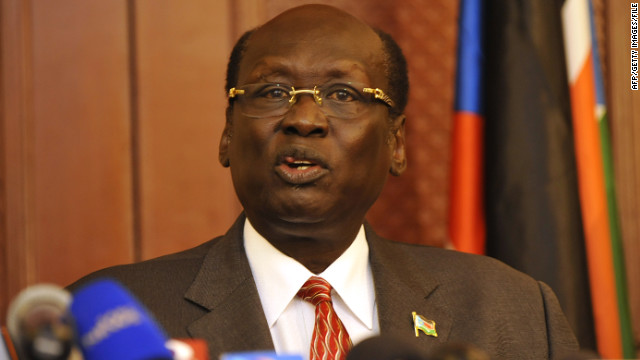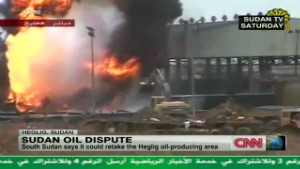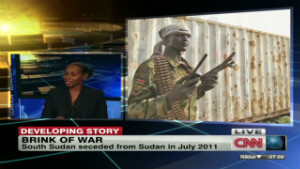April 22, 2012 -- Updated 2020 GMT (0420 HKT)

South Sudanese Information Minister Barnaba Marial Benjamin said rival Sudan began a series of attacks Sunday morning.
STORY HIGHLIGHTS
- South Sudan's information minister reports hours of bombings
- A Sudanese military spokesman cannot be reached for comment
- "They are trying to drag us back into a war," the South Sudanese official says
- Satellite images suggest damage to oil fields
"There have been bombings
since 9 this morning, and at 1 o'clock they launched a ground attack,"
said Barnaba Marial Benjamin, South Sudan's minister of information.
The clashes came after the southern army said it withdrew troops from a contested, oil-rich border region.
A spokesman for the
Sudanese military could not be immediately reached for comment. Claims
from both sides are difficult to confirm, as journalists and independent
observers do not have access to the front lines.
South Sudan announced
Friday that it would comply with a request from the United Nations
Security Council to pull troops out of the disputed oil-rich region of
Heglig, which it had occupied since April 10. Sudan claimed its forces
had forced southern troops out and captured the area.
Benjamin said his
country's army withdrew to bases near the border and inside South Sudan.
Sudanese forces crossed the border and attacked them there, he said.

Sudan oil dispute

Sudan, South Sudan's bitter divisions
"They are trying to drag
us back into a war, and that's what the Security Council didn't want,"
he said. "They must tell them to stop these attacks."
Benjamin said the bases
near the border have been repeatedly attacked in the past by Sudanese
troops based in Heglig, and those previous attacks prompted South Sudan
to occupy the area.
Heglig is on the border created last year when the two countries split.
Sudanese President Omar al-Bashir had vowed to "never give up" the disputed region.
While both countries
claim Heglig, Sudan continued administering the region after South Sudan
declared independence last July following a two-decade civil war.
The south took with it three quarters of the formerly united country's oil reserves, a loss that sent Sudan's economy reeling.
Sudan's oil industry
suffered further when fighting in Heglig forced a halt to oil production
in those fields, which account for about half of the country's entire
production of 115,000 barrels a day. Satellite images suggest that
infrastructure in the Heglig oil fields may have been severely damaged
by the fighting.
The Satellite Sentinel
Project released images Sunday that suggest a critical part of the oil
pipeline infrastructure was destroyed. The collection manifold, which
allows oil flows to be separated or combined without interrupting the
flow, appears to have been damaged by an explosion.
"The evident destruction
of the collection manifold is a big deal in that this by itself is
likely to result in immediate cessation of oil flow from the area," said
Jonathan Hutson, a spokesman for the project, which is led by the
Harvard Humanitarian Initiative.
Hutson said analysts could not determine whether the destruction was the result of ground fighting or aerial bombardment.
On Friday, South Sudan's
military spokesman, Philip Aguer, told reporters in Juba that Sudan had
bombed Heglig's central processing facility the previous day and that
it continued to burn.
Serious damage to the
facility would prevent companies from resuming production and would
require substantial investment to repair or rebuild.
Sudan has accused South
Sudan of destroying oil infrastructure and said it would attempt to
force South Sudan to pay for damages.
The renewed fighting
follows an appeal Saturday by U.S. President Barack Obama, urging the
countries to "choose peace" and return to negotiations.
"You still have a chance
to avoid being dragged back into war," he said in a video, which was
subtitled in Arabic and posted to the White House website.

No comments:
Post a Comment